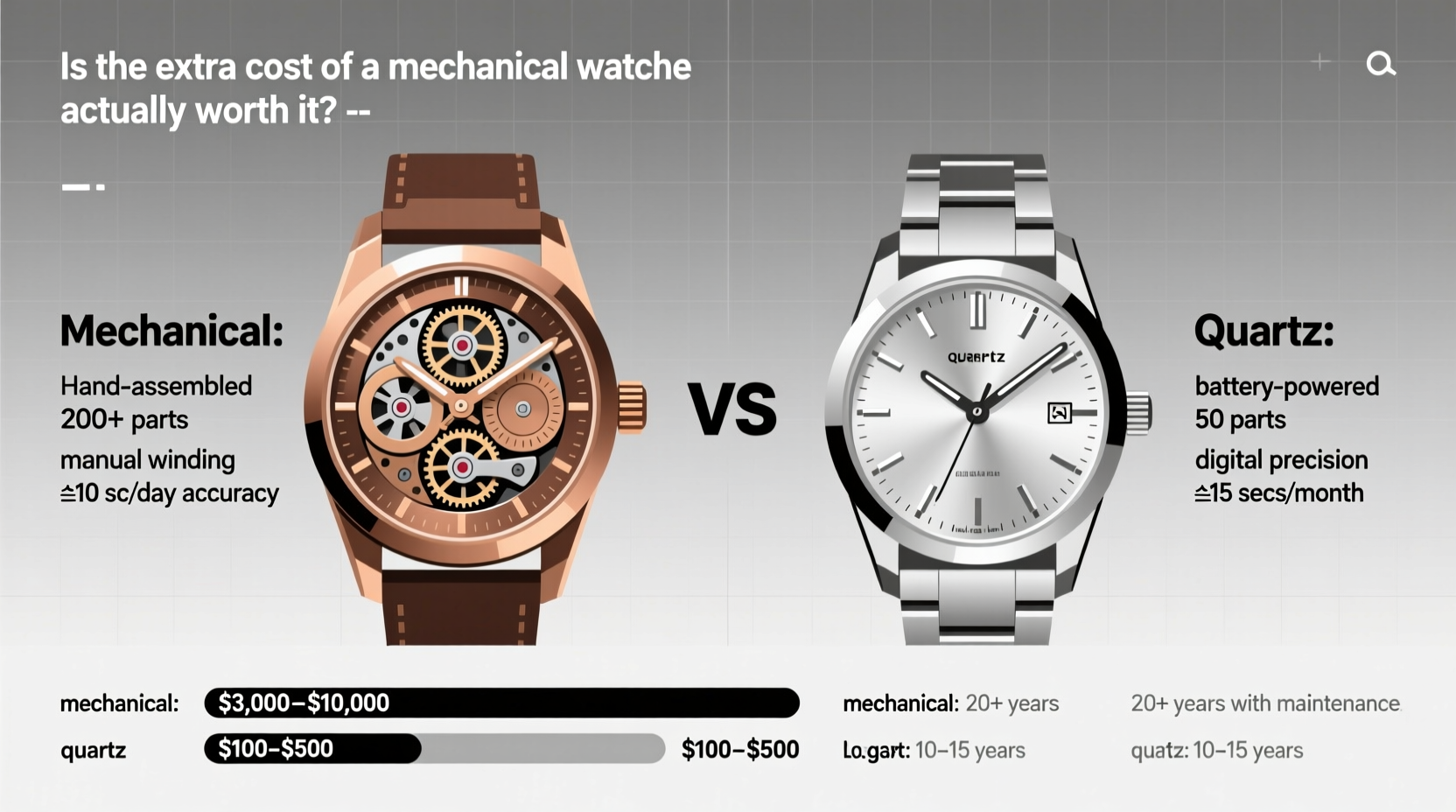When shopping for a timepiece, one of the first decisions you’ll face is whether to choose a mechanical or quartz watch. Mechanical models often come with price tags that are five, ten, or even a hundred times higher than their quartz counterparts. But what exactly are you paying for? Is the craftsmanship, heritage, and intricate engineering behind a mechanical movement truly worth the premium? Or is quartz technology simply smarter, more accurate, and more practical for modern life?
This article breaks down the key differences between mechanical and quartz watches, evaluates their long-term value, and helps you decide whether spending more on a mechanical watch is a wise investment—or just emotional indulgence.
How Mechanical and Quartz Watches Work

The fundamental difference lies in how each type keeps time.
Mechanical watches rely on a complex system of gears, springs, and levers powered by a wound mainspring. As the spring unwinds, it releases energy that drives the escapement mechanism, regulating the movement of the hands. These watches fall into two categories: manual-wind (requiring daily winding) and automatic (self-winding through wrist motion).
Quartz watches, introduced in the 1960s, use a battery-powered electronic oscillator regulated by a tiny quartz crystal. When electricity passes through the crystal, it vibrates at a precise frequency—32,768 times per second—which an integrated circuit counts to advance the second hand once per second. This makes quartz movements exceptionally accurate and low-maintenance.
Performance Comparison: Accuracy, Maintenance, and Durability
Let’s examine how the two types stack up across critical performance metrics.
| Feature | Mechanical Watch | Quartz Watch |
|---|---|---|
| Average Accuracy | +/- 5 to +20 seconds per day | +/- 15 seconds per month |
| Power Source | Mainspring (wound manually or automatically) | Battery (lasts 1–5 years) |
| Maintenance Interval | Every 5–7 years (full service) | Every 2–3 years (battery & seal check) |
| Longevity (with care) | 50+ years (many last over a century) | 10–20 years (electronics may degrade) |
| Shock Resistance | Moderate (delicate components) | High (solid-state electronics) |
While quartz wins decisively in accuracy and convenience, mechanical watches shine in longevity and repairability. A well-maintained mechanical movement can be serviced indefinitely, with parts machined or replaced as needed. In contrast, many quartz watches become obsolete when their circuits fail, especially if replacements aren’t available.
“Mechanical watches are not about telling time—they’re about celebrating human ingenuity. You’re wearing a miniature machine built to last generations.” — Daniel Reardon, Horology Curator at the British Watch Museum
Real-World Example: Two Watches, Ten Years Later
Consider two individuals who bought watches in 2014: Mark chose a $250 quartz Seiko, while James invested $2,200 in a Swiss-made automatic Omega Seamaster.
Over ten years, Mark replaced the battery three times ($75 total), kept the watch clean, and wore it regularly. The watch remained accurate but developed minor cosmetic wear. In 2023, he tried to sell it online and received offers around $120.
James had his Omega serviced in 2019 ($350), polished the case lightly, and rotated it with other watches. By 2024, the Omega retained 85% of its value and attracted collector interest due to its model’s growing reputation. It now sells for $1,800–$2,000 on the pre-owned market.
This example illustrates a broader trend: mechanical watches, particularly from respected brands, often hold or even appreciate in value. Quartz watches, unless iconic (like vintage Casios or Grand Seikos), typically depreciate steadily.
When the Extra Cost Makes Sense: A Decision Checklist
Not every buyer needs a mechanical watch. Use this checklist to determine if the premium is justified for your situation.
- ✅ Do you appreciate craftsmanship, history, and mechanical artistry?
- ✅ Will you wear the watch regularly (at least 3–4 times per week)?
- ✅ Are you willing to service it every 5–7 years?
- ✅ Is resale value or heirloom potential important to you?
- ✅ Does the brand and model have a strong reputation or collectible status?
- ✅ Can you afford the initial cost plus long-term maintenance?
If you answered “yes” to most of these, a mechanical watch is likely worth the investment. If not, a high-quality quartz model—such as a Grand Seiko 9F or a Longines VHP—offers superior precision and lower ownership costs.
Step-by-Step Guide to Choosing the Right Movement Type
- Define your purpose: Is this a daily wearer, dress watch, tool watch, or collector’s item?
- Set your budget: Include future servicing costs for mechanical options.
- Test wear both types: Notice how they feel on your wrist and how you interact with them.
- Research brand reliability: Some brands excel in quartz (Casio, Seiko), others in mechanical (Rolex, Patek Philippe).
- Consider long-term goals: Do you want to pass it down? Resell it? Wear it casually?
- Make your choice: Align your decision with lifestyle, values, and expectations.
Frequently Asked Questions
Can a quartz watch ever be considered luxury?
Yes. High-end quartz watches from brands like Grand Seiko, Breitling, and Jaeger LeCoultre use thermocompensated movements that are accurate to ±10 seconds per year. They also feature exquisite finishing and limited production, making them legitimate luxury items despite their battery power.
Do mechanical watches need to be wound every day?
Manual-wind mechanical watches do require daily winding, usually via the crown. Automatic watches self-wind when worn for 8–10 hours a day. If left idle, they stop after 38–72 hours (depending on power reserve) and must be re-wound or placed on a watch winder.
Are mechanical watches less reliable than quartz?
They are less accurate and more sensitive to shocks and magnetism, but not necessarily less reliable. With proper care, a mechanical watch can function flawlessly for decades. Reliability depends on usage patterns, maintenance, and build quality—not just movement type.
Final Verdict: Is the Extra Cost Worth It?
The answer depends on what you value. If your priority is precision, convenience, and affordability, quartz is objectively superior. A $500 quartz watch will outperform a $10,000 mechanical one in terms of timekeeping accuracy and ease of ownership.
But mechanical watches offer something beyond utility: soul. The rhythmic sweep of the second hand, the visible complexity through a sapphire caseback, the ritual of winding—it all connects you to centuries of horological tradition. These watches are micro-machines crafted by skilled artisans, designed to outlive their owners.
For many, that intangible experience justifies the cost. A mechanical watch isn’t merely a tool; it’s a statement, a companion, and sometimes, a legacy. If you find joy in mechanics, beauty in imperfection, and meaning in longevity, then yes—the extra cost is worth it.









 浙公网安备
33010002000092号
浙公网安备
33010002000092号 浙B2-20120091-4
浙B2-20120091-4
Comments
No comments yet. Why don't you start the discussion?